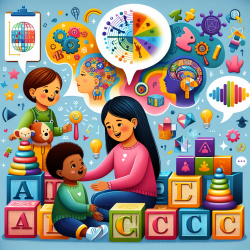Introduction
As a speech-language pathologist dedicated to improving child outcomes, it is crucial to leverage data-driven insights and evidence-based practices. The Abecedarian Approach, a comprehensive early intervention program, offers a wealth of research-backed strategies that can significantly enhance mental health and social development in children. This blog delves into the findings from the research article "Mental Health and Social Development Effects of the Abecedarian Approach" and explores how practitioners can apply these insights to improve their practice.
Understanding the Abecedarian Approach
The Abecedarian Approach is a pioneering early intervention program designed to support children's development from birth through school entry. It emphasizes adult-child interactions and has been rigorously tested through longitudinal studies across various countries. The approach integrates four core elements:
- Language Priority: Encouraging daily opportunities for communication, even with infants, to foster language development.
- Conversational Reading: Engaging children in interactive reading sessions that promote active participation and developmental progress.
- Interaction Games: Tailoring games to individual children's interests and developmental levels to enhance cognitive and social skills.
- Enriched Caregiving: Integrating educational content into daily care routines to support holistic development.
Key Findings and Implications
The Abecedarian Approach has demonstrated significant positive outcomes in various domains:
- Mental Health: Children who participated in the program showed fewer symptoms of depression and anxiety in young adulthood.
- Social Development: Enhanced attachment, communicative initiations, and social decision-making skills were observed in children exposed to the approach.
- Language Development: The program significantly improved language skills, closing the gap between disadvantaged children and their peers.
- Long-term Benefits: Participants exhibited healthier lifestyles, reduced risky behaviors, and lower rates of criminal activity in adulthood.
Practical Applications for Practitioners
Practitioners can incorporate the Abecedarian Approach into their work by:
- Prioritizing language-rich interactions throughout the day.
- Engaging children in interactive and responsive reading sessions.
- Designing games and activities that cater to individual interests and developmental stages.
- Embedding educational content into routine caregiving tasks.
By adopting these strategies, practitioners can create environments that nurture cognitive, social, and emotional development, setting children on a path to lifelong success.
Encouraging Further Research
While the Abecedarian Approach offers a robust framework, continued research is essential to refine and adapt these strategies to diverse contexts. Practitioners are encouraged to explore the original research and consider how they can contribute to the growing body of knowledge in early childhood intervention.
To read the original research paper, please follow this link: Mental Health and Social Development Effects of the Abecedarian Approach.










